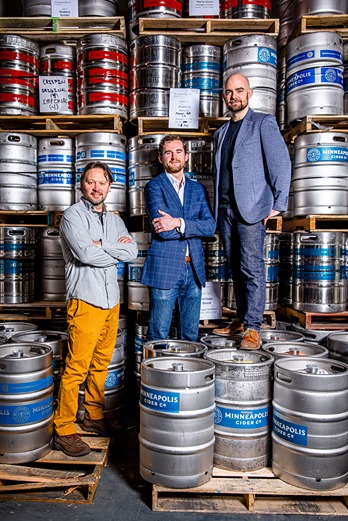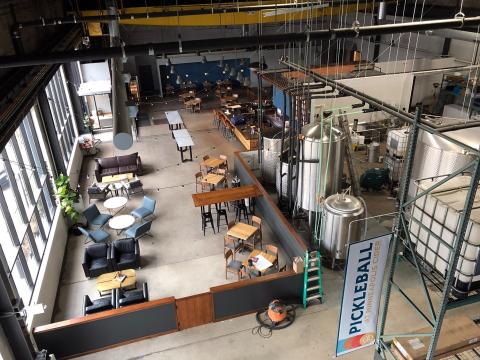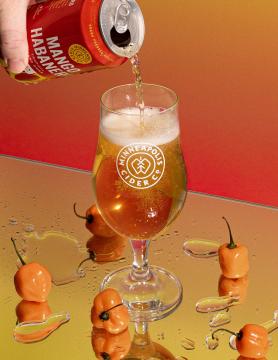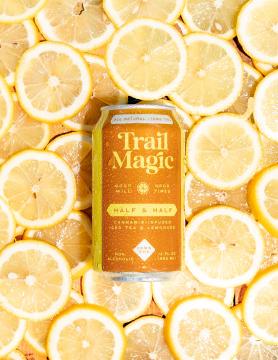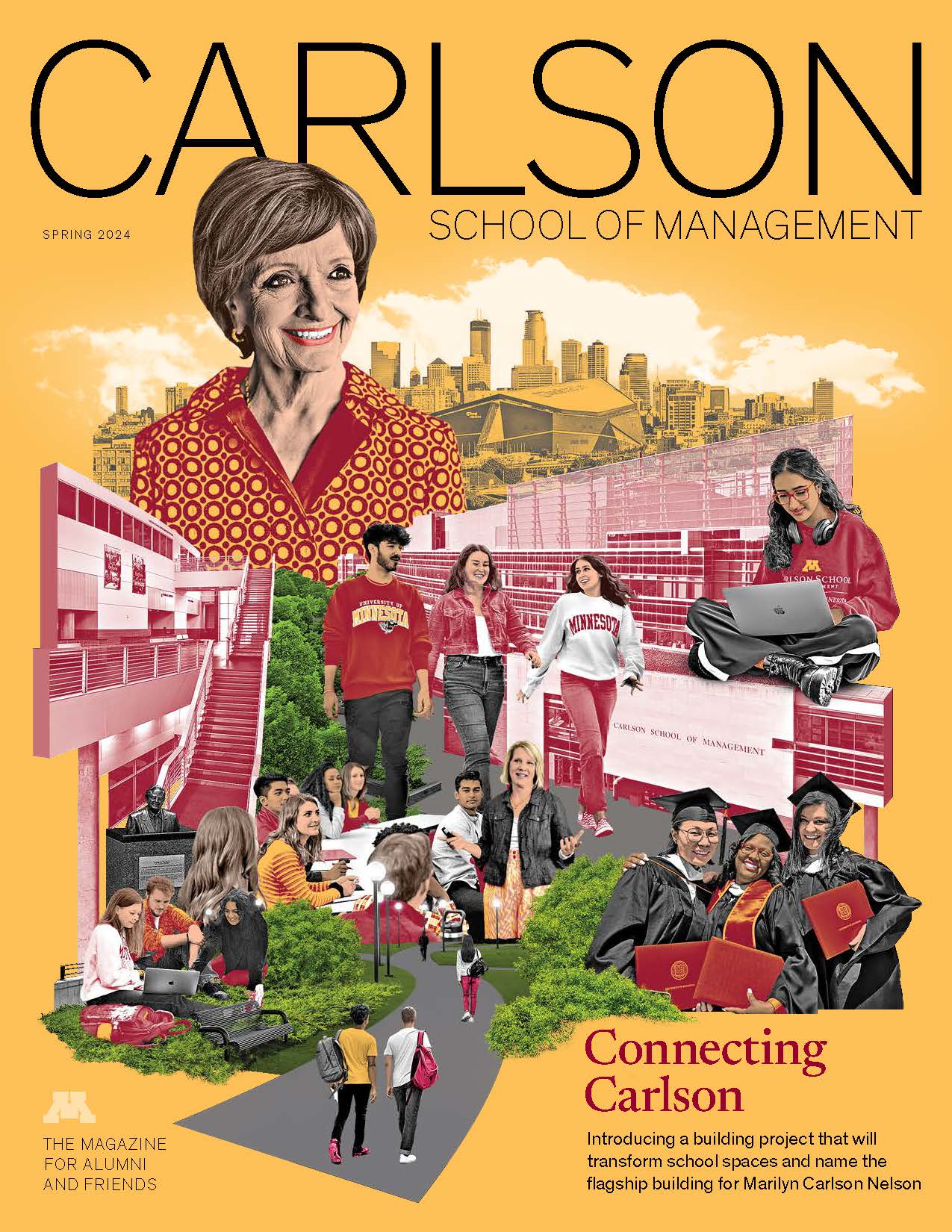
From Carlson to Cannabis: Minneapolis Cider Company
Friday, April 5, 2024
By Adam Overland
Starting a business is a lot like planning for an outdoor adventure in the Boundary Waters, explains David O’Neill, ’15 BSB, cofounder of Minneapolis Cider Company (MCC) and an avid backpacker. Gather supplies, plan your journey, and imagine the beauty and serenity in the vast, watery wilderness...and then the mosquitos get you, the rain never stops, and your canoe tips over. And that, in a nutshell, is entrepreneurship.
"The thing that actually happens is not going to be what you imagined, but at least for me, there’s this very romantic sense of independence, and a kind of test,” says O’Neill. “Starting a business is like the ultimate game.” Before Minneapolis Cider Company became what is today—a multimillion-dollar business recently named by Inc. Magazine as among the fastest-growing private companies in America—it was a class project by cofounders O’Neill and Jason Dayton, ’15 College of Continuing and Professional Studies. That Carlson School class—Entrepreneurship in Action—is where undergraduates form small teams to launch and operate a real business using start-up funds across two semesters. The pair found themselves together not long after they both returned from a semester studying abroad in London. There, each gained a taste for hard cider, one of the city’s most popular alcoholic drinks. In the course, it served as a business idea: Lionheart Cider.
“We wanted a space where we could host people, bring people together, use our cider to do that and have a place where we can try different styles.” David O’Neill, ’15 BSB
“The whole brand premise was ‘We’re seniors in college trying to make our way in the world. We’re lionhearted, we’re bold,’” says O’Neill. “We wanted to empower others to feel that way and drink our products.” It was 2015, and looking back now, the MCC founders—who were all of 21—chuckle at their naivete. “At the beginning of the course, everybody pitches the first iteration of their business,” recalls Dayton.
“So I came in and pitched cider, and [O’Neill] will give me quite a bit of crap about this, but I had a slide in my deck that said ‘Cider is easy.’ And it was going to cost $2,500 to launch Lionheart Cider and we’d be in stores by Christmas.” “There was literally a slide titled ‘Cider is easy,’” O’Neill confirms.
Turns out, cider is not easy
The tinkering began. Dayton started working with his then-girlfriend, Holly—she later became his wife—whose family makes cider and wine as a hobby. Soon, they landed on a winning recipe for Lionheart Original. Through instructor John Stavig, ’86 BSB, also professional director of the Gary S. Holmes Center for Entrepreneurship, they raised $55,000 for a first production run. Now they just needed a manufacturer and a distributor. After not finding a Minnesota–based option, Stavig connected them with Joe Heron, a University alum and founder of multiple beverage companies, including Crispin Hard Cider Company—once among the largest in the U.S. Heron brought in Bruce Nissen, Crispin’s former head cidermaker, based in Washington state. With a manufacturer at the ready, they needed a distributor. That became Todd Johnson, a member of the Entrepreneurship in Action course advisory board and co-owner of Johnson Brothers, one of the largest liquor distributors in Minnesota.
“Cider was growing at the time, and I think Johnson Brothers saw something there,” Dayton says. “And so they told us, ‘We’ll buy anything you make for the first run and then see how it goes.’” Everything was coming together. Then the canoe tipped over.
“The manufacturer in Washington sent us samples,” says Dayton. “We get them back in Minnesota, and we’re so excited that we drop them off at our distributor without even trying them.
“It’s 3:30 [p.m. the next day]. I’m sitting with my wife doing homework at Starbucks, and we get a call from the brand manager at Johnson Brothers, and he says, ‘Guys, I just tried the samples. These are terrible. We’re not buying this.’”
It turns out that when they scaled up from homebrewing equipment to commercial cider, the recipe didn’t translate
“I booked the next flight to Washington, and thankfully, they hadn’t packaged it all, so it was all still sitting in tanks,” says Dayton.
Understanding the predicament and sensing Dayton’s panic, Nissen invited him to stay at his house for the weekend and figure out a plan. “We made some tweaks and adjustments—basically the acidity level was off—and [Nissen] helped us work through that,” says Dayton. “We sent it to Johnson Brothers again, and they said, ‘This is great. Package it up and send us the rest.’ So, the company almost died before we ever made the product.” “The company almost died an infinite amount of times,” agrees O’Neill.
Righting the Ship
That first production run sold out. They raised more capital and produced and sold more Lionheart. For a few years, both Dayton and O’Neill worked full-time jobs and kept selling cider through liquor stores. With everything they made going into the business, and thin to non-existent margins, something had to change.
“It got to a point where we realized this isn’t sustainable,” says O’Neill. “Every decision we were making, we were betting the farm. We needed something where we could have a little bit of room to innovate and make mistakes and take risks.”
They needed to change their business model.
“We wanted a space where we could host people, bring people together, use our cider to do that and have a place where we can try different styles,” says O’Neill. “And frankly, the business model of a taproom; this is a real business. And that affords us the ability to scale, to buy equipment, and expand the production facility.”
They started planning. In 2017, O’Neill and Dayton connected with Rob Fisk, a 2011 U of M graduate with a master’s in horticulture. Fisk had worked with, and managed, orchards that made cider on the side for years—but he wanted something bigger.
“I had told myself that cider was going to be my retirement plan,” says Fisk. “Over the course of my career, I’d save up money and buy land and plant trees. But the further I got into it, I was meeting people in the industry.”
Competing in the MN Cup
Part of MCC’s success comes from participating in the Minnesota Cup. Founded by the Carlson School in 2005, MN Cup is the country’s largest statewide startup competition.
More than 20,000 Minnesota entrepreneurs, including U of M students and faculty, have participated over the years—many of them receiving a share of more than $5 million in cash prizes.
“I think the experience of going through that and trying to compete and the connections that we made . . . it was just a fantastic way to bring our business idea and get rocks thrown at it from a whole set of other people,” says O’Neill.
It was at a cider festival that Dayton pitched Fisk: Join the team as head cidermaker, with plans to build out a taproom. The three set about searching for the right facility and found it in the Marcy-Holmes neighborhood of Minneapolis, just blocks from where Crispin got its start in 2007.
In May of 2019, the Minneapolis Cider Company taproom opened. O’Neill left his day job and settled into a full-time finance and operations role with MCC. Like all businesses, they muscled through the pandemic. In March 2021, Dayton left his position with Target to work in MCC’s brand development, sales, and marketing.
And then on July 1, 2022, they were ready to stake a new claim: Minnesota legalized the possession and use of marijuana for residents 21 and older. Beverage companies were free to make and sell drinks infused with cannabis (sans alcohol).
Trail Magic Mania
Seeing an opportunity, and with no pre-planning, the team moved quickly. “Jason basically came to us and said, ‘Guys, this law just changed. How do you feel about jumping off a cliff and building our wings on the way down?’” recalls O’Neill.
“We dropped everything and 19 days later we had created a brand and had liquid in a package,” says O’Neill. “We were the first to market. And that’s been really driving a lot of sales for us in the last six or so months.”
In fact, that brand—Trail Magic—has grown so quickly (more than 1 million cans sold already) that new dreams began to unfold.
“Trail Magic has really helped us break into a larger production model and start to expand our production facility,” Dayton says about MCC’s new products.
The challenge, though, is the highly regional nature of craft beer and cider. “It’s really hard, if not impossible, to take Minneapolis cider to Texas or Massachusetts or Washington,” says Dayton.
Full-Circle Cider
Turns out, the trio’s solution was already part of their story. Remember that first production run, led by the Crispin founders? Well, by 2022, beverage giant Molson Coors, who acquired it 10 years earlier, had shuttered it—despite selling about 700,000 cases in 2019, the last time it was sold.
MCC saw the potential of two recognizable brands. It’d be a one-two punch to break into markets around the country.
“So, I texted Joe Heron,” says Dayton. “And I said, ‘Do you think Molson Coors would have any interest in selling the brand?’ We ended up with a long-term licensing agreement without having to write a seven-figure check upfront.”
With MCC now at the helm, Crispin returned to shelves in Minnesota, Wisconsin, Iowa, and North and South Dakota in November 2023 with three ciders—Crispin Original and two new imperial flavors—all brewed by original Crispin cidermaker (and MCC hero) Bruce Nissen. The rollout will continue until it’s available nationwide, with plans to launch in the United Kingdom.
Today, Minneapolis Cider Company operates one of the largest cider taprooms in the country—27,000 square feet, which includes three pickleball courts and a private event space in addition to the taproom and outdoor seating.
And with Crispin distribution expanding rapidly, it’s likely that Minneapolis Cider Company will soon be the most widely distributed cidery in Minnesota.
“It’s been a crazy journey,” O’Neill says. “We seem to reinvent our business every six months. So we really do see ourselves as entrepreneurs, where we just kind of look for different things that are happening, and we try and make it possible.”
And all this from a couple of lion-hearted college students just trying to make their way in the world.
“The core of that Lionheart story, and the business that exists today, is that it’s built on the kindness of alumni who were willing to give their time to a couple of students who really didn’t know any better and provide whatever support they were able to,” says Dayton.
“There’s a lot of smarts and grit that go into this,” agrees O’Neill, “but that doesn’t push the needle past ‘Go.’ All of that is predicated on John Stavig and the Entrepreneurship in Action class. It’s predicated on the alumni that we were connected with.”
On brewing cider, from MCC head cidermaker Rob Fisk
“The best way to describe it for me is if you think about table grapes and wine grapes, it’s about the same thing. Table grapes are bred to be sweet, more about texture and sweetness. And then a wine grape has a lot of tannins in it. That’s what gives it body. So there’s apples that are exactly the same way. Most U.S. apples are table apples, like Honeycrisp—it’s bred to be crunchy and have a good balance of acid and sugar. Cider apples are mostly bred in Europe, where they were breeding those apples for hundreds of years to make alcohol. So they have a lot of tannin, a lot of sugar to make the alcohol. But they’re not crunchy. So when you’re breeding things, you’re selecting for something. And if you’re selecting for the crunch, that means you’re deselecting or selecting against something else. With table apples, you lose some of the more interesting aromatics because you don’t really care about aromatics as much when you’re eating an apple. But that’s all you care about when you’re drinking cider.”
Portraits by Drew Anthony Smith
